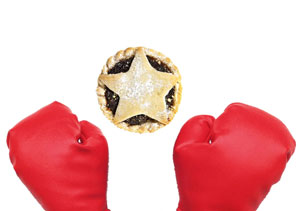’tis the season for family feuding.
Why is it that kith seems so much less quarrelsome than kin?
 Ah, Christmas, joyous season of toasty comforts, belt-straining excess and uninspiring journalism. Among the many ghosts of Christmas past helping hungover hacks pad the pages at this time of year are the polls surveying what people hate the most about it. According to this one, plucked at random from a Google search, for almost a quarter of Americans seeing their family is high on the list.
Ah, Christmas, joyous season of toasty comforts, belt-straining excess and uninspiring journalism. Among the many ghosts of Christmas past helping hungover hacks pad the pages at this time of year are the polls surveying what people hate the most about it. According to this one, plucked at random from a Google search, for almost a quarter of Americans seeing their family is high on the list.
The cliché is as hackneyed as the journalism these polls beget; parental disappointments will emerge from the thinnest of veils, old scores will get a fresh chance to be settled, self-inflated siblings, bubbling with tales of how well they’re doing, will involuntarily cry out for a well-aimed deflating barb or three, the perennial underachiever will be poised for the first of many well-rehearsed fuck-offs.
While a sizeable number of us may be dreading seeing and squabbling with family over Christmas, surveys seem devoid of people saying the same things about their friends.
Why?
You can choose your friends
The easiest of answers is another well-worn cliché, you can choose your friends but you can’t choose your family. Bound by our DNA we will generally have far more in common with our immediate family than with some random dude plucked from the street. But each of us is a random mixture of two people’s DNA, each of us has developed along our own path and been shaped by our own, unique experiences. Even the closest of siblings can show an awful lot of differences.
Most of us will however have far more similarities with, than differences from our family members, and while we may choose our friends we do not choose their friends, their partners or their partners’ friends. Our wider social circle is hardly an eclectic one and hard to avoid during the party season, yet we seem to find it easier to bear the unbearable with friends than we do with family.
Surely there must be more going on.
Memories are made of this
Perhaps the answer lies in our history. None of us will have friends going back further than our parents and elder siblings, not to mention the plethora of familial hangers-on like uncles, aunts and cousins we grew up with. We will almost certainly have accumulated more baggage with our kinfolk than with our kith, more simmering resentment, old scores not yet settled and battles lost that still sting us when we think of them.
But many of us have had bad experiences with our long-term friends as well and yet seem able to firmly bury the hatchets. Sure, there may be fewer hatchets to bury but can quantity really account for our being able to bury a dozen hatchets with our friends but not a baker’s dozen with family?
Could it be that the grave is shallower?
The ties that bind
Perhaps that grave is shallower because unconditional love means it doesn’t need to be all so deep. Within reason, no matter how hard a time our family gives us nor how hard a time we give them, we still love each other and we’re still there for each other.
We have more leeway to be ourselves, warts and all, with our family and perhaps we do simply capitalise on those rare chance to do so. However I think unconditional love may have a bit more to answer for.
The price of the ties that bind
We share more genes with our family than with anyone else. In our prehistoric past when our prospects for individual survival were much dicier, the survival and success of our immediate family would secure a chance that at least part of our genes would be passed on and flourish in future generations. Our family are “our team” and their success (or otherwise) will always be more a part of our own success (or otherwise) than the success of our friends (or otherwise) can ever be.
Ding-dong un-merrily back home
That we would have evolved a sense of ownership over our immediate family’s lives, a competitive sense that we all need to play for the same side and “do well” together seems entirely reasonable. Sadly we don’t seem to have evolved a common definition of what to “do well” actually is, and the modern world offers more scope to define “do well” differently than ever before.
I suspect therefore that the number of festive family feuds is not likely to shrink any time soon. But, as a Christmas non-combatant I’m not too concerned. I won’t be rowing with my relatives this festive season.
I won’t be seeing the buggers.